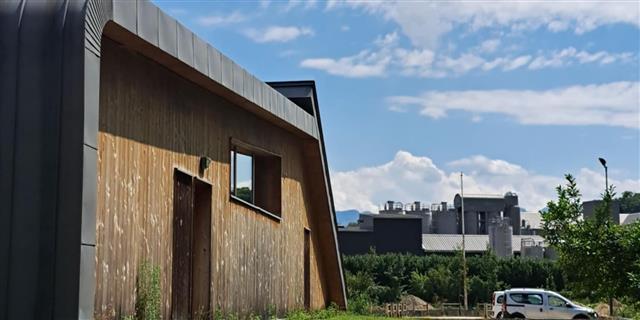21.07.2025 | Territorial Energy Transition and Citizen Mobilization: A Model of Ambitious, Bottom-Up Action.
As part of ECOEMPOWER’s work with pilot sites, Aurore Dudka from University of Trento visited Le Bourget-du-Lac, a rural municipality demonstrating how ambitious energy transition projects can succeed when anchored in strong local engagement. Her visit focused on two flagship initiatives: a biomass district heating network and a citizen-led micro-hydropower plant, complemented by an ambitious energy-saving plan.
Two Flagship Projects
The biomass district heating network, initially controversial due to concerns over truck traffic and emissions, was redesigned in consultation with residents—relocated and equipped with advanced filtration to reduce impacts.
At the same time, the citizen-led organization Eau et Soleil du Lac is developing a citizen-owned hydropower plant on a historic mill site, leveraging local expertise and infrastructure. Expected to produce 1.5 GWh/year, the project illustrates how citizen-led initiatives can complement municipal action.
An innovative hydroelectric battery project (STEP 73) is also under consideration to better manage the intermittency of renewable energy sources. What makes this initiative particularly noteworthy is that, despite being carried by private organizations—including former members of the local "Eau et Soleil du Lac” collective—it has been developed through strong local dialogue and co-construction. As a result, it has encountered no significant opposition, in contrast to a similar project proposed elsewhere around the lake that lacked such community engagement.
Anchored in Participation
Long before these projects, the municipality organized citizen forums to define priorities, ensuring decisions reflected local needs. Today, trust and dialogue remain central to how projects evolve and gain acceptance.
Energy Savings and Everyday Action
The municipality is also tackling energy use head-on, targeting a 45% reduction in public building consumption through measures like:
-
hiring an energy manager,
-
lowering heating temperatures,
-
renovating key buildings,
-
and raising staff awareness.
Some buildings have already cut consumption by over 50%, supported by substantial public subsidies. These efforts have nurtured a strong sense of collective self-efficacy among residents and local actors, reinforcing trust in both the process and municipal leadership, and highlighting the power of coordinated, community-driven action.
Key Lessons for ECOEMPOWER
Aurores visit confirmed several insights relevant to our mission:
-
Complex technologies require strong communication, explanation, and trust-building to ensure community support.
-
Citizen engagement often relies more on sustained relationships and local pride than on formal participation mechanisms.
-
Keeping ownership and benefits local fosters legitimacy, transparency, and acceptance.
-
Beyond infrastructure, the energy transition opens space to address more transversal and tangible issues such as insulation, mobility, cooling, and shared self-consumption—often closer to people’s everyday concerns than abstract energy debates.
-
A supportive and committed local political will provides fertile ground for the development of a renewable energy community (REC). It helps bridge technical ambitions with the social and cultural realities of a territory, and can act as a crucial catalyst for wider citizen mobilization.
Le Bourget-du-Lac shows how a small community can pursue ambitious goals and bring its citizens along—not just as beneficiaries, but as active partners.
